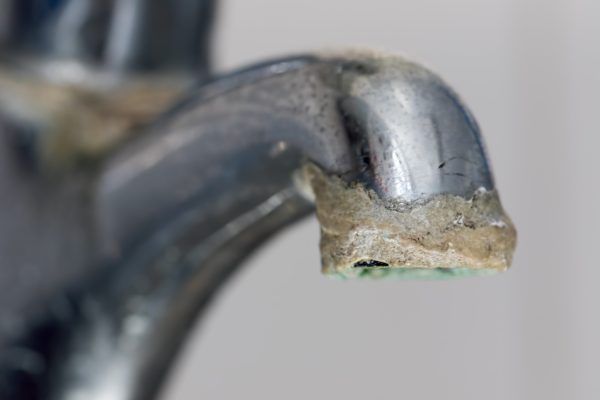
If you’re like most homeowners, you want to keep your home in top condition. One way to do that is by preventing limescale from building up in your plumbing and fixtures. Limescale can cause many problems, from clogged pipes to decreased water pressure. Keep reading for tips on how to keep your plumbing clear and free of buildup!
What Does Limescale Look Like?
Limescale is a complex, chalky deposit that can accumulate on the inside of pipes and appliances. The white, powdery substance is made up of calcium carbonate, which is found in water with high mineral content. While limescale is not harmful to your health, it can be unsightly and difficult to remove. Over time, the deposits can cause plumbing problems and damage to appliances. If you live in an area with hard water, there are several things you can do to prevent limescale buildup in your home. Installing a water softener to remove the minerals from your water is a helpful first step. Using descaling agents to clean your pipes and appliances on a regular basis has also proven successful in limescale prevention. Beyer Plumbing also offers plumbing plans to keep your plumbing regularly maintained and repaired.
Is Limescale Bad for You?
Limescale is a natural deposit of calcium carbonate and magnesium bicarbonate that can build up on the surfaces of pipes and appliances over time. In small amounts, limescale is not harmful to humans and is actually a source of dietary calcium. However, in large quantities, limescale can be detrimental to health. Calcium carbonate is a base, so it can neutralize stomach acids and lead to indigestion. Additionally, magnesium bicarbonate can act as a laxative, causing diarrhea. In very large amounts, limescale can also contribute to kidney stones. Therefore, it is important to control the amount of limescale you expose yourself to.
Why You need to Remove Limescale
Limescale can build up over time, making it difficult for appliances to function properly and potentially shorten their lifespan. It also becomes more difficult to remove the longer it is left untreated. For these reasons, it is important to remove limescale on a regular basis. Luckily, there are a number of easy ways to remove limescale from surfaces in your home. Vinegar is a popular option, as it is inexpensive and effective. You can also choose from a wide array of commercial limescale removers. Whichever method you choose, regular limescale removal will help keep your plumbing and appliances in good condition.
Vinegar and Lemon Juice
As mentioned previously, vinegar and lemon juice are two natural ingredients that can help to prevent limescale formation. When used regularly, they can help to keep surfaces clean and free of buildup. Vinegar is especially effective at dissolving limescale, so it can be used to clean already-affected areas. Lemon juice, on the other hand, helps to prevent limescale from forming in the first place. By adding a few tablespoons of lemon juice to your water, you can help to keep limescale at bay.
Descaling Agents
If you live in an area with hard water, using a descaling agent on a regular basis is another great way to prevent limescale buildup. Descaling agents are designed to dissolve limescale and other mineral deposits, making them a great choice for regular maintenance. Beyer Plumbing offers descaling agents as part of our plumbing plans, making it easy to keep your home free of limescale buildup.
Removing Limescale From Your Bathroom
When it comes to cleaning the bathroom, one of the peskiest chores is removing limescale from taps, showerheads, and tiles. Use a damp cloth to wipe down surfaces with limescale. For tougher buildups, you may need to use a scrub brush or abrasive cleaner. Rinse the area with clean water and dry it off. Finally, apply a preventative to help prevent future buildup. With these simple tips, you can quickly and easily remove limescale from your bathroom.
Common Appliances Affected by Limescale
Common appliances that limescale can affect include dishwashers, washing machines, coffee makers, and kettles. To help prevent limescale buildup, it is important to descale your appliances on a regular basis. This can be done with a commercial descaling solution or a homemade vinegar and water solution. With a little bit of effort, you can keep your appliances running like new.
Clean Your Appliances Regularly
Appliances that use water, such as washing machines, dishwashers, and kettles, can quickly accumulate a layer of limescale. This hard, chalky deposit can affect the performance of your appliances and cause long-term damage. To prevent limescale from building up, it is important to clean your appliances regularly. For best results, use a descaling solution designed specifically for removing limescale. Follow the instructions on the packaging carefully to avoid damaging your appliance. With regular cleaning, you can keep your appliances limescale-free.
Electronic Water Descaler Solutions
An electronic water descaler is a very effective tool against limescale buildup. It works by sending electronic pulses through the pipes, which disrupts the minerals that cause limescale. This process does not use chemicals or salt, making it a much safer and environmentally friendly option than other methods of descaling. Electronic water descalers are also very easy to install and require very little maintenance. In most cases, they can be simply plugged into an outlet and left to do their job. As a result, they are an ideal solution for those who want to protect their appliances from limescale buildup without using harsh chemicals.
Water Softener Options
Water softeners are a great way to improve the quality of your water. There are a few different types of water softeners on the market, so it is important to do your research to find the one that best suits your needs. One type of water softener is an ion-exchange system. This type of system uses charged beads to remove minerals from your water. Another type of water softener is a reverse osmosis system. This type of system forces water through a semi-permeable membrane, leaving mineral deposits behind. If you are interested in a more natural option, there are also water softeners that use potassium chloride instead of salt. Regardless of which type of water softener you choose, you will notice a difference in the quality of your water. Your dishes will be cleaner, your clothes will be softer, and your skin will feel smoother. In addition, you will no longer have to worry about limescale buildup in your appliances.
Get Professional Help With Beyer Plumbing
Since 1990, Beyer Plumbing has been providing top-quality plumbing services to residents and businesses in San Antonio, Texas. We are a family-owned and operated business, and we take pride in our work. We offer a wide range of services, including residential, commercial, and construction plumbing. No job is too big or too small for us. Whether you need a simple repair or a complete re-piping of your home or business, we can help. Call us today to schedule a consultation!


